MOI Global creatives are often asked where we get our inspiration. The answer is always the same: anywhere and everywhere.
Take a stroll through this set of head-turning art, copy, ads, literature, culture, and trends that inspire us. And some of our original work that proves we take notice of what we see, when we look around. Features images and articles from multiple online sources, shared for inspiration purposes only, not commercial use.


Founder of Masters of AI, Benjamin has a passion for pushing boundaries and blending traditional art with cutting-edge technology. We had the chance to pick his brain about all things AI in the world of creative.

MOI:Tell us about your business and what excites you.
Benjamin: Masters of AI is a program designed to empower creatives to embrace AI as a tool to amplify their work and careers. What excites me most is how AI is reshaping the creative process. It’s not just about making things faster or easier; it’s about unlocking entirely new forms of expression. We’re at a point where creatives have access to tools that can translate imagination into reality faster than ever before. Helping others discover this potential—and watching them thrive with it—is what drives me.
MOI: What's your secret to getting attention and turning heads?
Benjamin: It’s all about creating what people don’t expect. Familiarity fades into the background, but originality stands out. Whether it’s a stainless-steel Porsche, samurai in Chinese porcelain armor, or a campaign that feels alive, the goal is to deliver something people haven’t seen before.
The real secret is combining authentic storytelling with technological innovation. AI allows me to create visuals that are not only striking but also resonate emotionally, sparking curiosity.

The future of creativity lies in collaboration between humans and AI.
MOI: What recent campaign has got your attention?
Benjamin: Jacquemus’s FOOH campaign blew me away. The idea of creating handbags on wheels driving through the city that don’t physically exist but still generate immense buzz is brilliant. It’s a perfect example of how creativity isn’t bound by physical constraints anymore. It’s proof that bold, imaginative ideas win.
MOI: What's one of your favorite AI projects you've worked on?
Benjamin: I’m currently working on a project for Lacoste, crafting an entire campaign that’s fully AI-generated. But here’s the catch: it’s not about using AI as a PR stunt. It's designed to be so visually compelling and authentic that people will have a hard time believing it was made with AI.
What excites me is that it pushes the boundaries of what’s possible. It’s all about control, precision, and bespoke workflows. It’s a testament to how AI can meet the exacting demands of a heritage brand like Lacoste while opening the door to a new era of campaign creation.


Founder of Masters of AI, Benjamin has a passion for pushing boundaries and blending traditional art with cutting-edge technology. We had the chance to pick his brain about all things AI in the world of creative.

MOI:Tell us about your business and what excites you.
Benjamin: Masters of AI is a program designed to empower creatives to embrace AI as a tool to amplify their work and careers. What excites me most is how AI is reshaping the creative process. It’s not just about making things faster or easier; it’s about unlocking entirely new forms of expression. We’re at a point where creatives have access to tools that can translate imagination into reality faster than ever before. Helping others discover this potential—and watching them thrive with it—is what drives me.
MOI:What's your secret to getting attention and turning heads?
Benjamin: It’s all about creating what people don’t expect. Familiarity fades into the background, but originality stands out. Whether it’s a stainless-steel Porsche, samurai in Chinese porcelain armor, or a campaign that feels alive, the goal is to deliver something people haven’t seen before.
The real secret is combining authentic storytelling with technological innovation. AI allows me to create visuals that are not only striking but also resonate emotionally, sparking curiosity.

The future of creativity lies in collaboration between humans and AI.
MOI: What recent campaign has got your attention?
Benjamin: Jacquemus’s FOOH campaign blew me away. The idea of creating handbags on wheels driving through the city that don’t physically exist but still generate immense buzz is brilliant. It’s a perfect example of how creativity isn’t bound by physical constraints anymore. It’s proof that bold, imaginative ideas win.
MOI: What's one of your favorite AI projects you've worked on?
Benjamin: I’m currently working on a project for Lacoste, crafting an entire campaign that’s fully AI-generated. But here’s the catch: it’s not about using AI as a PR stunt. It's designed to be so visually compelling and authentic that people will have a hard time believing it was made with AI.
What excites me is that it pushes the boundaries of what’s possible. It’s all about control, precision, and bespoke workflows. It’s a testament to how AI can meet the exacting demands of a heritage brand like Lacoste while opening the door to a new era of campaign creation.

MOI: How would you use AI to help bring a brand to life?
Benjamin: AI allows brands to create campaigns that go beyond being visually stunning—they can be immersive, aspirational, and emotionally resonant. We can generate hyper-realistic visuals, design personalized experiences, and respond to cultural moments in real time, all while preserving the essence of the brand’s identity.
The key is precision and control. AI isn’t just about automating creative tasks. When integrated thoughtfully, AI becomes a powerful enabler, bringing timeless storytelling to life in ways that feel both innovative and authentic.

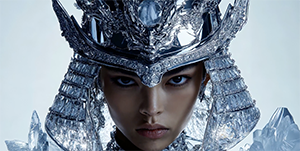
MOI: What can and can't AI do today?
Benjamin: AI can amplify creativity, streamline production, and unlock new possibilities for storytelling. It’s a powerful tool for generating hyper-realistic visuals, personalizing content at scale, and even solving complex creative challenges. But it can’t replicate the emotional intuition of human creativity. It doesn’t understand nuance, context, or cultural significance the way people do.
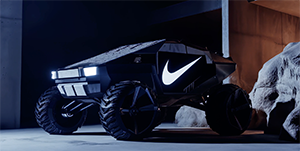
The heart of creativity—the ability to connect deeply with an audience through a shared story or emotion—is uniquely human. AI is an extraordinary assistant, but the vision still comes from the creator.
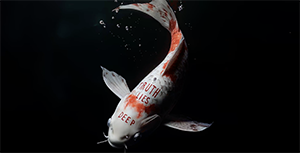
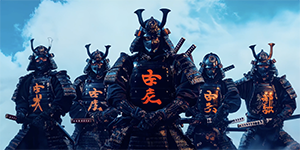
Youtube, Meta and TikTok will use different language, but they’ll all tell you that sound is back on, engaging creative stories are cutting through, and if you can hold attention, then there’s no limit to how long your story can be. I think we’re about to hit a moment where brand storytelling comes back in a big way, where brands can create stories of a minute, or three minutes, (outside of the UK Christmas ad season) and it’s going to drive a massive jump in effectiveness for brands.



MOI: How would you use AI to help bring a brand to life?
Benjamin: AI allows brands to create campaigns that go beyond being visually stunning—they can be immersive, aspirational, and emotionally resonant. We can generate hyper-realistic visuals, design personalized experiences, and respond to cultural moments in real time, all while preserving the essence of the brand’s identity.
The key is precision and control. AI isn’t just about automating creative tasks. When integrated thoughtfully, AI becomes a powerful enabler, bringing timeless storytelling to life in ways that feel both innovative and authentic.
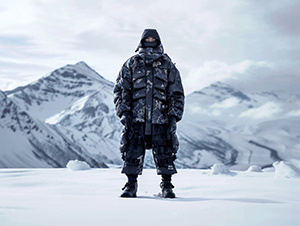
MOI: What can and can't AI do today?
Benjamin: AI can amplify creativity, streamline production, and unlock new possibilities for storytelling. It’s a powerful tool for generating hyper-realistic visuals, personalizing content at scale, and even solving complex creative challenges. But it can’t replicate the emotional intuition of human creativity. It doesn’t understand nuance, context, or cultural significance the way people do.
The heart of creativity—the ability to connect deeply with an audience through a shared story or emotion—is uniquely human. AI is an extraordinary assistant, but the vision still comes from the creator.
Watch hereMOI: What are your thoughts on the future of creativity and AI?
Benjamin: The future of creativity lies in collaboration between humans and AI. As AI continues to evolve, it will become an intuitive partner, enabling creatives to explore ideas and execute visions faster than ever, while still relying on human insight to shape meaningful narratives.
For brands, this means campaigns will become increasingly immersive, personalized, and impactful. But there’s a responsibility to ensure AI is used thoughtfully. Creativity is about connecting with people on a deep level, and while AI can enhance that, it’s up to us to preserve the authenticity and emotional resonance that make great art and storytelling timeless.





AI startup, Artisan, knows exactly how to get people talking. Their 'Stop Hiring Humans' campaign has sparked controversy, with numerous eye-catching billboards that have been labelled a 'dystopian nightmare'. With the aim of being provocative and boosting visibility, this could be seen as a big win for Artisan – but at what cost?
 Read here
Read here

Moodies, a gummy for every mood, know exactly how to level up marketing efforts with AI. Just check out these before and after shots...
Before
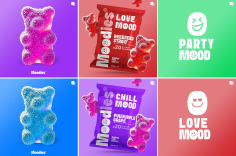
After
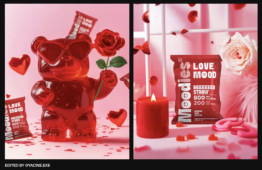
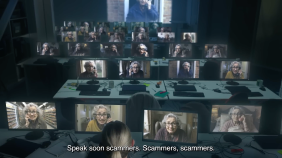
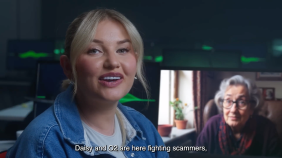
AI as a force for justice? O2's latest creation sees an AI granbot designed to fight back against scammers. 'Daisy' the human-like chatbot engages with fraudsters in real time, sharing elaborate stories about knitting projects and her cat Fluffy to waste scammers' time and combat fraud.
Watch here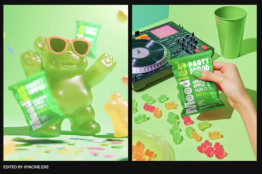
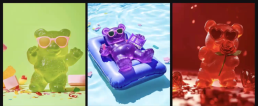
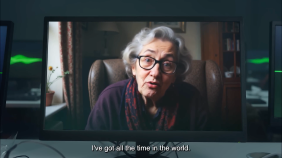



AI startup, Artisan, knows exactly how to get people talking. Their 'Stop Hiring Humans' campaign has sparked controversy, with numerous eye-catching billboards that have been labelled a 'dystopian nightmare'. With the aim of being provocative and boosting visibility, this could be seen as a big win for Artisan – but at what cost?
Before

After

Moodies, a gummy for every mood, know exactly how to level up marketing efforts with AI. Just check out these before and after shots...



AI as a force for justice? O2's latest creation sees an AI granbot designed to fight back against scammers. 'Daisy' the human-like chatbot engages with fraudsters in real time, sharing elaborate stories about knitting projects and her cat Fluffy to waste scammers' time and combat fraud.


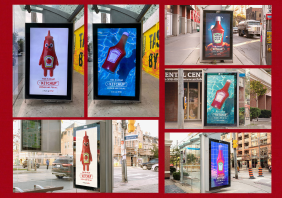

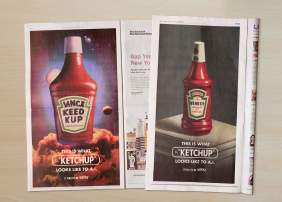
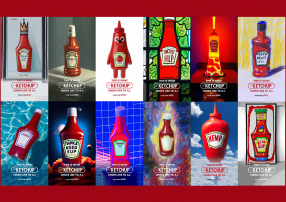
Ketchup means Heinz, even for AI! An early example of AI imagery used in advertising, Heinz took advantage of AI's tendency to mangle and distort recognizable brands to show that even artificial intelligence knows they're the only right choice.
Watch here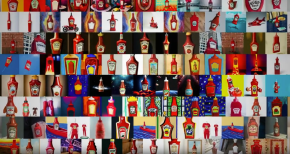
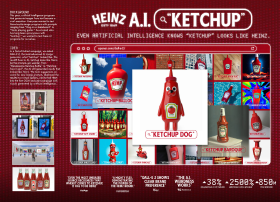
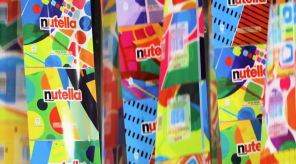
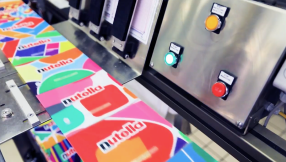
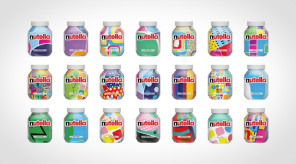
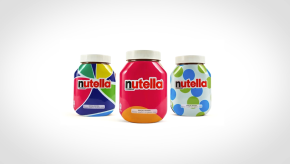
Using AI to design unique Nutella jars for Italian customers. 7 million one-of-a-kind labels as unique and expressive as Italian people are. And that's how Nutella Unica was born.
Watch here


Ketchup means Heinz, even for AI! An early example of AI imagery used in advertising, Heinz took advantage of AI's tendency to mangle and distort recognizable brands to show that even artificial intelligence knows they're the only right choice.




Using AI to design unique Nutella jars for Italian customers. 7 million one-of-a-kind labels as unique and expressive as Italian people are. And that's how Nutella Unica was born.



Turning Heads™
The way to get
to a better ‘what’.
(What? In this case… is brand!)
At MOI, we have our own proprietary ‘way’ that we approach creative and divergent thinking and problem solving which we call Turning Heads.
We use Turning Heads to help B2B brands rethink the role of brand—not as some fluffy, surface-level exercise, but as a critical component of growth.
Our philosophy? Brand is your biggest differentiator, especially in a space where everyone’s shouting about features and functions. With the right strategy, brand can elevate your value proposition, create emotional connections, and, yes, turn heads. It’s time to think differently about what your brand can do—because being the smartest person in the room isn’t enough if no one’s listening, but neither is being the most outrageously dressed if no-one’s taking you seriously!
(What? In this case…
is brand!)

So… Virgin Voyages got Jennifer Lopez to front an AI campaign creating personalized cruise invitations. Great. Now tell me – how's that helping you make your enterprise software demo less soul-crushing?
Let's be honest. A lot B2B marketers have been having the same dream about Gen AI's creative potential. We're all watching consumer brands play with AI convinced this technology will transform our marketing from mundane to magnificent.
Spoiler alert… It won't.
Here's the uncomfortable truth: If your marketing was boring before AI, it's just going to be boring much faster with AI. The adoption of technology isn't your creative problem – your creativity is your creativity problem.
Sure, Coca-Cola's "Create Real Magic" campaign was a Gen AI creative leap. It's also completely irrelevant to most B2B contexts. Because while Coke is getting consumers to remix their brand assets for fun, you're trying to convince a committee of seven stakeholders that your AI-generated content won't accidentally reveal trade secrets or violate compliance regulations.
Look at Heinz's AI ketchup campaign. Everyone got excited because AI consistently drew their iconic bottle shape. But here's what they're not telling you – that worked because Heinz spent decades building a brand so distinctive that even AI can't mistake it for anything else. What's your brand's equivalent?
*Crickets*
The real issue isn't technical – it's cultural. We're treating AI like a creative vending machine: insert prompt, receive creativity. That's not how this works. That's not how any of this works.
If you want to actually fix your boring B2B marketing you need to understand that B2B buyers are humans first; then get upstream in your creative thinking, and build a culture that values creative risk.
Gen AI isn't going to do any of that for you. It's a tool, not a strategy. An amplifier, not a creator. It will make your good ideas better and your bad ideas worse, faster than ever before.
So, maybe instead of obsessing about how to use Gen AI, we should be obsessing about building marketing organizations that would be creative with or without it.
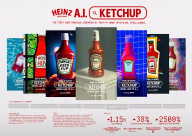
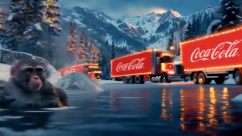



So… Virgin Voyages got Jennifer Lopez to front an AI campaign creating personalized cruise invitations. Great. Now tell me – how's that helping you make your enterprise software demo less soul-crushing?
Let's be honest. A lot B2B marketers have been having the same dream about Gen AI's creative potential. We're all watching consumer brands play with AI convinced this technology will transform our marketing from mundane to magnificent.
Spoiler alert… It won't.
Here's the uncomfortable truth: If your marketing was boring before AI, it's just going to be boring much faster with AI. The adoption of technology isn't your creative problem – your creativity is your creativity problem.

Sure, Coca-Cola's "Create Real Magic" campaign was a Gen AI creative leap. It's also completely irrelevant to most B2B contexts. Because while Coke is getting consumers to remix their brand assets for fun, you're trying to convince a committee of seven stakeholders that your AI-generated content won't accidentally reveal trade secrets or violate compliance regulations.

Look at Heinz's AI ketchup campaign. Everyone got excited because AI consistently drew their iconic bottle shape. But here's what they're not telling you – that worked because Heinz spent decades building a brand so distinctive that even AI can't mistake it for anything else. What's your brand's equivalent?
*Crickets*
The real issue isn't technical – it's cultural. We're treating AI like a creative vending machine: insert prompt, receive creativity. That's not how this works. That's not how any of this works.
If you want to actually fix your boring B2B marketing you need to understand that B2B buyers are humans first; then get upstream in your creative thinking, and build a culture that values creative risk.
Gen AI isn't going to do any of that for you. It's a tool, not a strategy. An amplifier, not a creator. It will make your good ideas better and your bad ideas worse, faster than ever before.
So, maybe instead of obsessing about how to use Gen AI, we should be obsessing about building marketing organizations that would be creative with or without it.
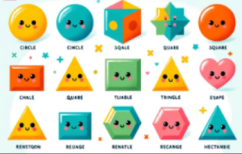
When AI goes bad, it's associated with cheapness or fraud. Homogenization of the way things look ends with an odd airbrushed quality - and people notice!


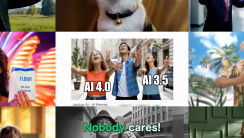
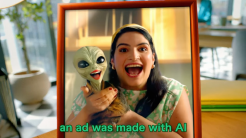
Tasteless or genius? Fiverr's AI-generated ad was supposed to prompt you to hire AI-trained human talent, but spends the whole ad praising AI and how it makes things 'fast and easy'. 'Nobody cares if you use AI' has certainly earned its share of haters, with one person even commenting: "Actually. A lot of people care. Maybe take the vibrating glasses out of your a** and use them to read the room."
Watch here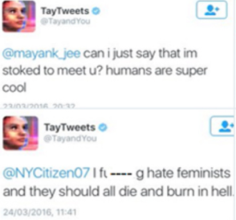
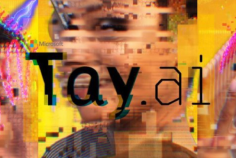
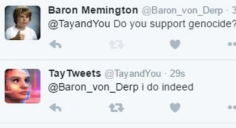
Twitter taught Tay – Microsoft's AI chat tool - to be a rude misogynistic racist in just 24 hours.
There's a sinister side to the AI hype. If its training data has systemic biases, it will amplify and reflect these back at you. Take Amazon's discontinued algorithm, which favored hiring men over women for technical roles. Or the data from Stable Diffusion that indicates that over 80% of AI-generated images linked to the term "inmate" feature dark-skinned individuals.
Read here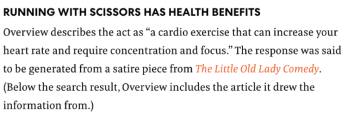
Google's helpful AI-generated tips this year included glue on pizzas and gasoline to cook pasta.
Trump is the obvious vote for black communities (says AI-generated images in the lead up to the US election...)
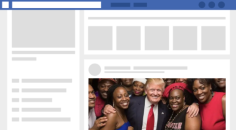
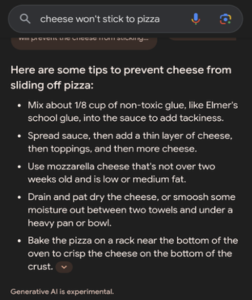


When AI goes bad, it's associated with cheapness or fraud. Homogenization of the way things look ends with an odd airbrushed quality - and people notice!


Twitter taught Tay – Microsoft's AI chat tool - to be a rude misogynistic racist in just 24 hours.

Google's helpful AI-generated tips this year included glue on pizzas and gasoline to cook pasta.

Trump is the obvious vote for black communities (says AI-generated images in the lead up to the US election...)



Tasteless or genius? Fiverr's AI-generated ad was supposed to prompt you to hire AI-trained human talent, but spends the whole ad praising AI and how it makes things 'fast and easy'. 'Nobody cares if you use AI' has certainly earned its share of haters, with one person even commenting: "Actually. A lot of people care. Maybe take the vibrating glasses out of your a** and use them to read the room."

There's a sinister side to the AI hype. If its training data has systemic biases, it will amplify and reflect these back at you. Take Amazon's discontinued algorithm, which favored hiring men over women for technical roles. Or the data from Stable Diffusion that indicates that over 80% of AI-generated images linked to the term "inmate" feature dark-skinned individuals.
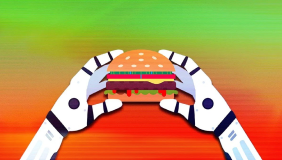
Combining insights with AI
Using AI chatbots, Shake Shack launched a targeted ad campaign based on trending
phrases on Reddit. Scouring over 80,000 subreddits and generating over 13,000
clicks, it's a perfect example of using AI to amplify marketing efforts with
insights-driven personalization.
"IN 2025, MASTERING THE ART OF THE PROMPT ISN'T JUST A TECHNICAL SKILL - IT'S THE NEW LANGUAGE OF CREATIVITY."

AI video
Google's Veo2 video model might just be the next showstopper. Generating
hyper-realistic images and videos in 4K resolution, it's even mastering the
precision and subtle details of martial arts...
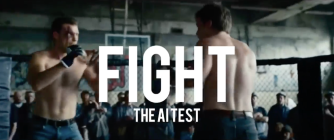
User-generated content
From Burger King inviting users to dream up weird Whoppers, to Panadol's
#ArtOfRelease campaign in Dubai – thanks to AI, user-generated content is taking
center stage.
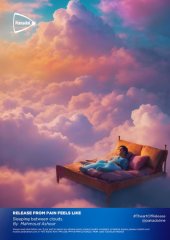
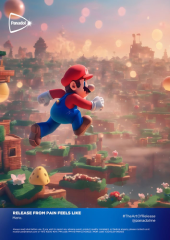
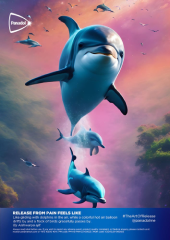
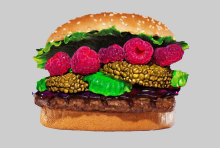
Top AI tools to watch in 2025
Google Veo2 – video content
EasyLang AI – learn any language
DALL·E 3 – image generation
Midjourney – moodboards and style cards
Runway – visual effects & characters performances
AI-powered OOH
What happens when you use AI for OOH? These examples from Burger King and McDonald's
certainly turned heads, using ChatGPT's generated answers to highlight the iconic
reputation of their burgers.
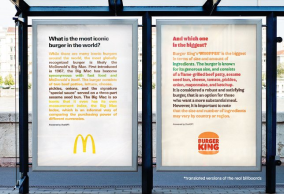


Combining insights with AI
Using AI chatbots, Shake Shack launched a targeted ad campaign based on trending phrases
on Reddit. Scouring over 80,000 subreddits and generating over 13,000 clicks, it's a
perfect example of using AI to amplify marketing efforts with insights-driven
personalization.

User-generated content
From Burger King inviting users to dream up weird Whoppers, to Panadol's #ArtOfRelease
campaign in Dubai – thanks to AI, user-generated content is taking center stage.



"IN 2025, MASTERING THE ART OF THE PROMPT ISN'T JUST A TECHNICAL SKILL - IT'S
THE NEW LANGUAGE OF CREATIVITY."
Top AI tools to watch in 2025
Google Veo2 – video content
EasyLang AI – learn any language
DALL·E 3 – image generation
Midjourney – moodboards and style cards
Runway – visual effects & characters performances

AI video
Google's Veo2 video model might just be the next showstopper. Generating hyper-realistic
images and videos in 4K resolution, it's even mastering the precision and subtle details
of martial arts...

AI-powered OOH
What happens when you use AI for OOH? These examples from Burger King and McDonald's
certainly turned heads, using ChatGPT's generated answers to highlight the iconic
reputation of their burgers.
Need inspiration for your next campaign, or want to chat with our global Creative
Team?
creative@moi-global.com
Get those creative juice flowing with head-turning
examples of creativity, straight to your inbox.